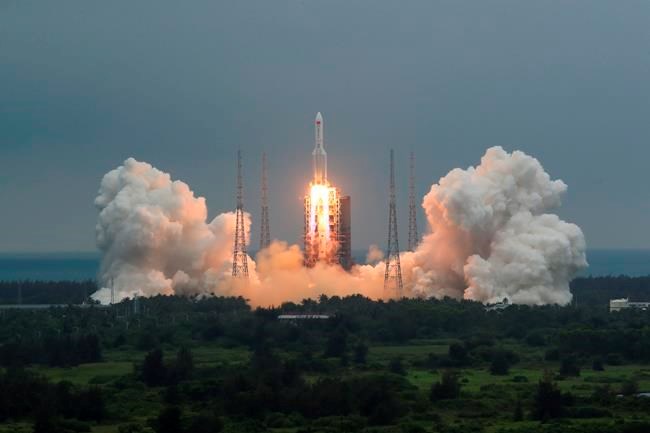BEIJING вҖ” China says the upper stage of its Long March 5B rocket that launched the core module of its space station will mostly burn up on re-entry, posing little threat to people and property on the ground.
Foreign Ministry spokesperson Wang Wenbing said Chinese authorities will release information about the -re-entry of the rocket, expected over the weekend, in a вҖңtimely manner.вҖқ
Wang said China вҖңpays great attention to the re-entry of the upper stage of the rocket into the atmosphere."
вҖңAs far as I understand, this type of rocket adopts a special technical design, and the vast majority of the devices will be burnt up and destructed during the re-entry process, which has a very low probability of causing harm to aviation activities and the ground," Wang said at a regularly scheduled briefing.
The largest section of the rocket that launched the main module of ChinaвҖҷs first permanent space station into orbit is expected to plunge back to Earth as early as Saturday at an unknown location.
Usually, discarded rocket stages re-enter the atmosphere soon after liftoff, normally over water, and donвҖҷt go into orbit.
ChinaвҖҷs space agency has yet to say whether the main stage of the huge Long March 5B rocket is being controlled or will make an out-of-control descent. Last May, another Chinese rocket fell uncontrolled into the Atlantic Ocean off West Africa.
The Communist Party newspaper Global Times said the stageвҖҷs вҖңthin-skinnedвҖқ aluminum-alloy exterior will easily burn up in the atmosphere, posing an extremely remote risk to people.
The U.S.
Where it will hit вҖңcannot be pinpointed until within hours of its reentry,вҖқ the Pentagon said in a statement Tuesday.
White House press secretary Jen Psaki said at a Wednesday briefing that the U.S. Space Command was вҖңaware of and tracking the locationвҖқ of the Chinese rocket.
The
The Long March 5B rocket carried the main module of Tianhe, or Heavenly Harmony, into orbit on April 29. China plans 10 more launches to carry additional parts of the space station into orbit.
The roughly 30-meter (100-foot) -long stage would be among the biggest space debris to fall to Earth.
The 18-ton rocket that fell last May was the heaviest debris to fall uncontrolled since the former Soviet space station Salyut 7 in 1991.
ChinaвҖҷs first space station, Tiangong-1, crashed into the Pacific Ocean in 2016 after Beijing confirmed it had lost control. In 2019, the space agency controlled the demolition of its second station, Tiangong-2, in the atmosphere.
In March, debris from a Falcon 9 rocket launched by U.S. aeronautics company SpaceX fell to Earth in Washington and on the Oregon coast.
The Associated Press



